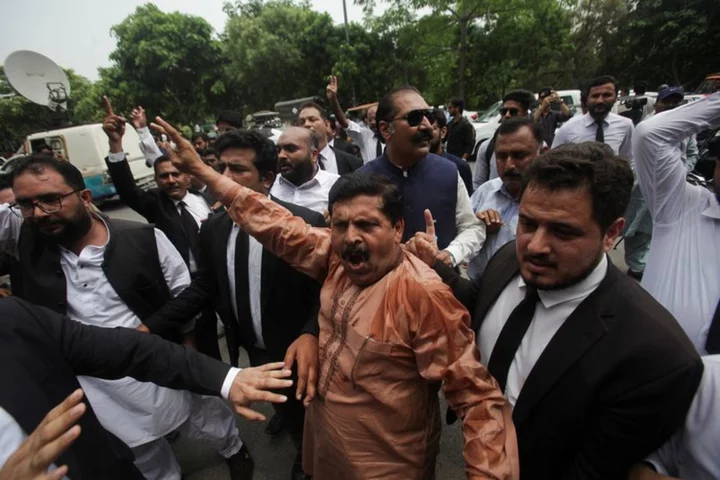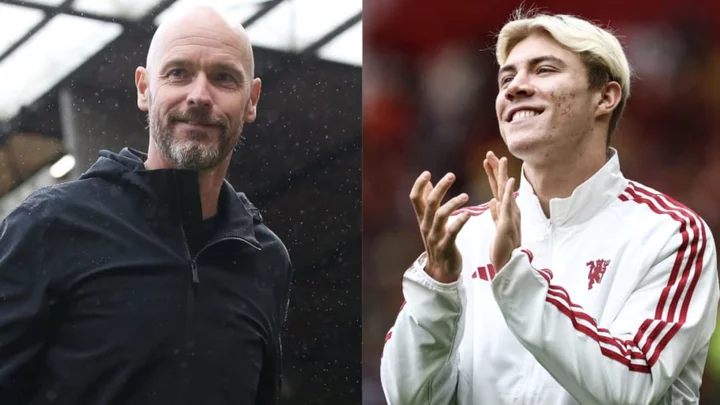By Charlotte Greenfield
ISLAMABAD (Reuters) -Pakistani former Prime Minister Imran Khan's lawyers could not reach him on Sunday after he spent the night in a jail near the capital following his arrest the previous day on a corruption conviction, spokespeople said.
Khan was taken by police from his home in the eastern city of Lahore on Saturday and transferred to Attock prison just outside Islamabad, where a court had convicted him of charges arising over the sale of state gifts.
The conviction likely means the cricket star-turned-politician will be disqualified from running in a national election.
"Attock prison is a 'No Go' area for (his) legal team as well as locals in the vicinity," said Naeem Haider Panjotha, Khan's spokesperson for legal affairs, adding they were unable to take him food or arrange the signing of key legal documents.
Pakistan's information minister referred a request for comment on Khan's access to his lawyers to provincial authorities in Punjab, where the jail is located. Punjab's top information official did not respond to a request for comment.
Another spokesperson for Khan, Zulfi Bukhari, told Reuters his lawyers were waiting in the town of Attock near the jail and were unable to meet Khan all day but were told by authorities to try on Monday.
He said the delays could hamper their attempts to swiftly appeal the trial court decision and to apply for bail. He added that the lawyers would seek first thing on Monday to get a time set for the court to hear their request for Khan's bail.
Bukhari said the former colonial prison did not have the facilities a former prime minister would normally be entitled to in Pakistan's prison system.
It was not clear whether Khan would appear in any court on Monday, after a trial court's surprise weekend decision sentencing him to three years in prison.
The arrest was the latest in a series of blows that have weakened Khan's political standing after he fell out with Pakistan's powerful military and his party splintered.
His Pakistan Tehreek-e-Insaf (PTI) party said it had filed appeals in higher courts over the decision.
Bukhari said over 100 PTI supporters had been arrested trying to protest since Saturday and that, though the party had initially called for nationwide peaceful protests, they did not want anyone to risk detention. Authorities have not confirmed the arrests and the information minister did not immediately respond to request for comment.
"We don't want to have our workers go through more pain and have our workers in prison and we don't want our leadership to be in prison especially at this time," Bukhari said.
Thousands of Khan's aides and supporters have been arrested since May, according to the interior minister. Many pro-Khan parliamentarians were also arrested and have distanced themselves from Khan, with some resigning from politics.
LOOMING ELECTIONS
Khan's arrest came days before the government was expected to dissolve parliament, which would normally lead to elections by November. But the government decided on Saturday to use the latest census as part of election procedure, potentially delaying the vote.
Bukhari said PTI's main demand was for free and fair elections as soon as possible.
Britain's foreign office said on Saturday it was closely monitoring the situation and supported democratic principles. Pakistan's government denies Khan's arrest was related to the election.
Legal experts say the conviction means Khan would likely be disqualified from politics for five years.
"Imran Khan's political future appears bleak after his arrest and disqualification," said Madiha Afzal, a fellow at Brookings' foreign policy program.
Khan's party vice chairman, former foreign minister Shah Mahmood Qureshi, has taken the helm of PTI in his absence.
Bukhari said PTI planned to take part in the elections. They hoped appeals would overturn the conviction and believed Khan's popularity in Pakistan would grow due to his imprisonment.
(Reporting by Charlotte Greenfield in Islamabad; Additional reporting by Mubasher Bukhari in Lahore; Editing by William Mallard and Hugh Lawson)









